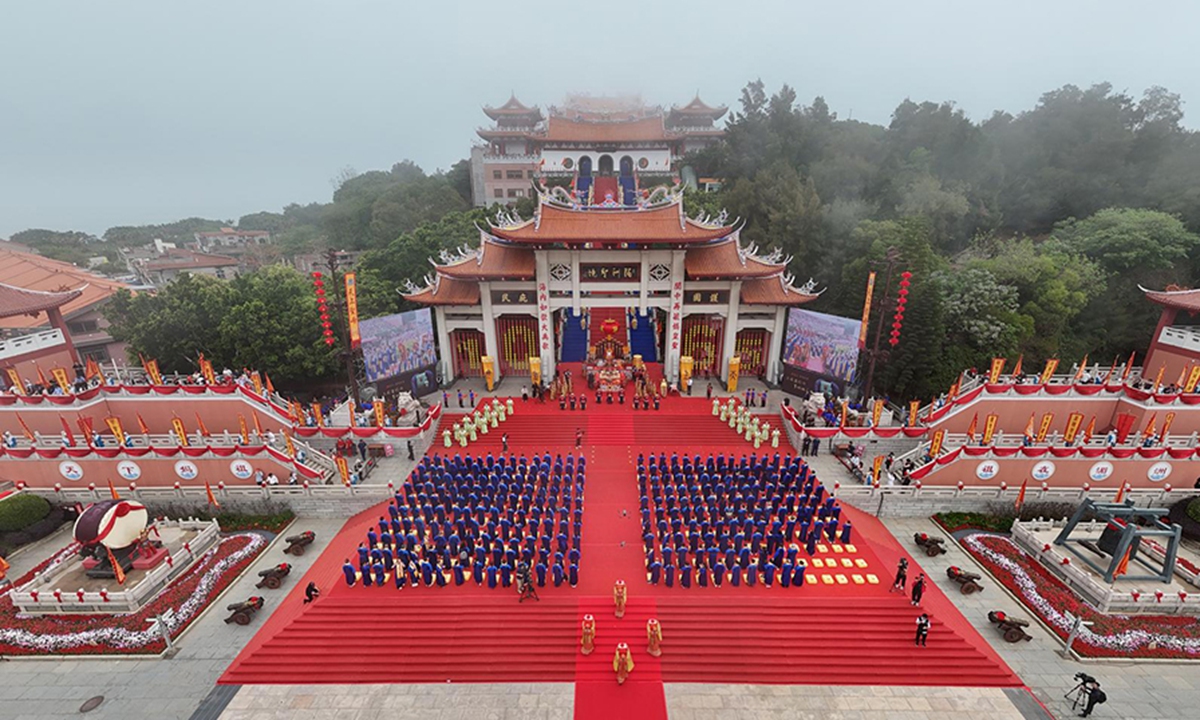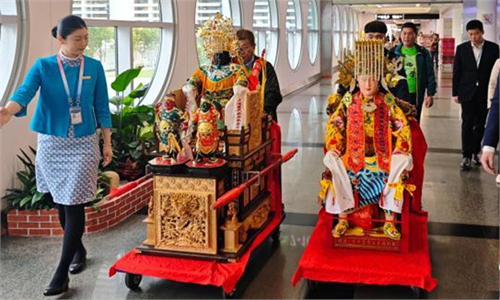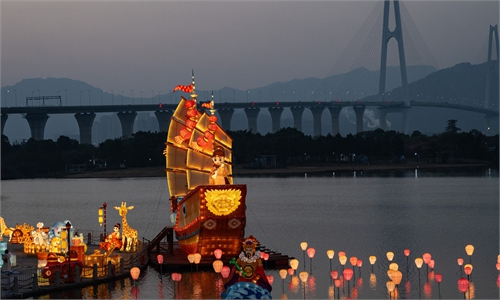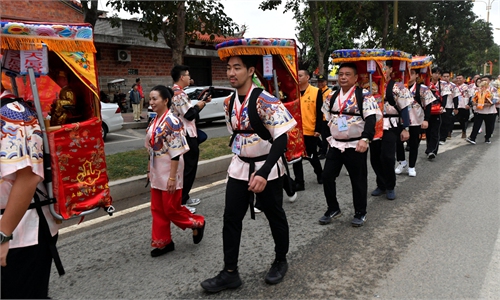ARTS / CULTURE & LEISURE
Faithful celebrate Mazu's birthday
Event shows unity, inspire interests across Straits

Photo: Xinhua
"I can feel the cohesion across the Taiwan Straits at the event site," Ma Jui-chun, a member of the Hsin Kang Feng Tian Temple on the island of Taiwan, told the Global Times on Monday upon arriving home after attending celebrations of the 1065th anniversary of Mazu's birth on Meizhou Island in Fujian Province, the birthplace of the sea goddess.Thousands of Mazu devotees from across the globe participated in the festivities, which featured a night vigil and the Spring Worship Ceremony over the weekend.
Representatives from more than 130 Mazu temples and cultural organizations spanning 25 countries and regions, including the US, Singapore, Australia and Peru, gathered for this cultural and spiritual reunion, reinforcing Mazu's enduring role as a symbol of peace, unity, and cultural heritage, according to a press release from the Meizhou Mazu Ancestral Temple obtained by the Global Times on Monday.
The grand Spring Worship Ceremony that took place at the temple's Tianhou Square officially commenced with the tolling of ceremonial bells, the beating of drums, and the firing of gun salutes.
A stately procession proceeded through the temple grounds to pay homage to Mazu.
Observing traditional rites, participants offered incense, fruit, and ceremonial items in a gesture of deep reverence and gratitude to the goddess.
The ceremony also featured a traditional dance performed at the square. This ancient ritual dance depicted the legendary tales of Mazu's bravery and selflessness in protecting sailors and promoting peace.
Seven 25-meter-long silk banners symbolizing the historic "Maritime Silk Road" were unfurled from different directions and then brought to the altar, representing the cultural and spiritual unity fostered by Mazu across regions and nations.
Dai Longcheng, mayor of Putian, which has jurisdiction over Meizhou Island, noted at the event that for over 1,000 years, Mazu culture has remained vibrant and become a bloodline memory connecting compatriots across the Taiwan Straits, serving as a cultural symbol of the emotional fusion that exists among Chinese communities both at home and overseas.
It has played a unique role in promoting mutual understanding and cultural exchanges.
"We established the connection with the Meizhou Mazu Ancestral Temple almost 40 years ago. And because Mazu belief serves as a cultural bridge between both sides of the Taiwan Straits, this connection has never been interrupted," Ma said while showing his approval of the address.
The importance of preserving and innovating Mazu culture was also highlighted at the event.
Lin Jinzan, head of the Meizhou Mazu Ancestral Temple, noted plans to host more cross-regional and international Mazu-related events, publish cultural literature, and enhance Mazu culture's global visibility.
He emphasized the need to continue fostering connections between people through Mazu's values, which remain highly relevant in today's world.
Before the worship ceremony, devotees braved the rain to honor Mazu on Saturday evening.
The evening's program included dance routines that showcased the depth and vibrancy of Mazu culture.
The performers, dressed in colorful traditional attire, brought the spirit of Mazu to life, earning enthusiastic applause and cheers from the audience.
One of the most touching moments of the night came when Liu Tao, a renowned Chinese actress and Mazu cultural global ambassador, took part in the rituals.
Liu accepted a ceremonial tray from a young local woman and ascended the temple steps to present a symbolic "longevity peach" cake to Mazu.
As a spiritual homeland longed after by devotees of Mazu, Meizhou Island has been approved as a national-level cross-Straits exchange base, becoming a forefront area for people-to-people communication between both sides of the Taiwan Straits, the Fujian Daily reported.
Mazu was a deified young woman named Lin Mo believed to have lived in the 10th century on Meizhou Island. Her legend speaks of compassion and kindness.
Revered as the guardian of maritime safety for centuries, she embodies a shared cultural heritage, with over 300 million devotees worldwide, including over 10 million on the island of Taiwan, the Xinhua News Agency has reported.
Mazu belief and customs were inscribed on UNESCO's Representative List of Intangible Cultural Heritage of Humanity in 2009.
Mazu culture has spread overseas alongside the development of China's maritime industry and the footsteps of maritime immigrants.




